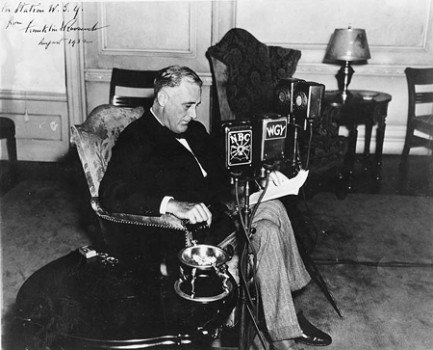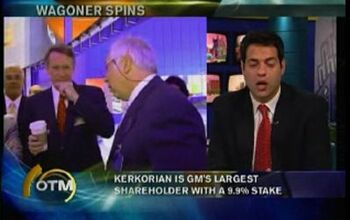Editorial: Between The Lines: President Bush's Bailout Defense
President Bush’s radio address this morning: “Good morning. For years, America’s automakers have faced serious challenges — burdensome costs, a shrinking share of the market, and declining profits. In recent months, the global financial crisis has made these challenges even more severe. Now some U.S. auto executives say that their companies are nearing collapse — and that the only way they can buy time to restructure is with help from the Federal government.
I’m not going to name names. I’m not going to lay blame. I’m just trying to clear my name.
This is a difficult situation that involves fundamental questions about government’s proper role. On the one hand, government has a responsibility not to undermine the private enterprise system. On the other hand, government has a responsibility to safeguard the broader health and stability of our economy.
I’m sacrificing A for B.
Addressing the challenges in the auto industry requires us to balance these two responsibilities. If we were to allow the free market to take its course now, it would almost certainly lead to disorderly bankruptcy and liquidation for the automakers. Under ordinary economic circumstances, I would say this is the price that failed companies must pay — and I would not favor intervening to prevent automakers from going out of business.
I don’t favor intervening in free markets unless I do.
But these are not ordinary circumstances. In the midst of a financial crisis and a recession, allowing the U.S. auto industry to collapse is not a responsible course of action. The question is how we can best give it a chance to succeed. Some argue the wisest path is to allow the auto companies to reorganize through Chapter 11 provisions of our bankruptcy laws — and provide a Federal loan to keep them operating while they try to restructure. But given the current state of the auto industry, my economic advisors believe that bankruptcy could now lead to its disorderly collapse — sending our economy into a deeper and longer recession.
A government-aided Chapter 11 is the right thing to do. But we’re not going to do it.
A more responsible option is to give auto companies an incentive to restructure outside of bankruptcy — and a brief window in which to do it. My Administration proposed legislation to achieve this, but Congress was unable to get a bill to my desk before adjourning for the year. This means the only way to stave off a collapse of the auto industry is for the executive branch to step in. So yesterday, I announced that the Federal government will grant loans to auto companies, which will provide help to them in two ways.
This is Barack Obama’s problem now.
First, the loans will give automakers three months to put in place plans to restructure into viable companies — which we believe they are capable of doing. Second, if restructuring cannot be accomplished outside of bankruptcy, the loans will provide time for companies to make the legal and financial preparations necessary for an orderly Chapter 11 process that offers a better prospect of long-term success.
We believe GM and Chrysler can do what they say they’re going to do– minus the bits they say they’re going to do. But I can’t say that. Because if I did, I would be saying I don’t believe them. Which would mean this bailout makes no sense whatsoever. Anyway, like I said, this is Barack Obama’s problem now.
The terms of the loans will require the auto companies to demonstrate how they would become viable. They must pay back all their loans to the government, and show that their firms can earn a profit and achieve a positive net worth. This restructuring will require meaningful concessions from all involved in the auto industry — management, labor unions, creditors, bondholders, dealers, and suppliers. If a company fails to come up with a viable plan by March 31st, it will be required to repay its Federal loans. Taken together, these conditions send a clear message to everyone involved in American automakers: The time to make the hard decisions to become viable is now — or the only option will be bankruptcy.
Chrysler and GM must pay back the federal loans because that’s what a loan is: something you pay back. Actually, fuck it. If they can’t repay the money, they can declare bankruptcy. At that point, no one’s going to care about a measly $17.4b.
The actions I’m taking represent a step that we all wish were not necessary. But given the situation, it is the most effective and responsible way to address this challenge facing our Nation. By giving the auto companies a chance to restructure, we will shield the American people from a harsh economic blow at a vulnerable time. And we will give American workers an opportunity to show the world once again that they can meet challenges with ingenuity and determination, and emerge stronger than before.
Who’s your Daddy?
Thank you for listening.”
More by Robert Farago
Latest Car Reviews
Read moreLatest Product Reviews
Read moreRecent Comments
- MaintenanceCosts Being married to someone who developed acute sensitivity to some VOCs after a smoke inhalation incident, I'm more aware of these things than I used to be. When we bring home a new car we've developed a protocol that helps quite a bit. First, leave the car in the sun for a day or two to speed the offgassing. Second, after doing that, wipe down all the surfaces in the car with fresh water. Third, leave the windows open when the car is in the garage. Fourth, wipe down again with water after a couple of weeks. Doing that substantially reduces new car smell pretty quickly after purchase.
- Bd2 While this is not breaking news a 11, it is a good reminder especially to the ultra affluent who purchase vehicles on a more regular basis.
- SCE to AUX At least with direct sales, there's one less party to point fingers about pricing.
- Wjtinfwb Malibu will be the Ford Panther of this decade. We won't miss it until its gone. GM will tell you there's no market for sedans anymore. Honda, Toyota, Nissan, Hyundai, Kia, Mercedes-Benz, BMW, VW, Audi and others will challenge you on that. GM gave up on Malibu as soon as it was introduced in 2017, no development, only de-contenting and relegation to "Fleet" status. I've had a lot of Malibu rentals, they were fine. Not as nice as an Accord or Camry, but preferable to an Altima, Sentra, Sonata or Jetta in my mind. A little development in the powertrain, refinement of the suspension and clean up on the styling would have done wonders. But that's not the GM way. Replace it with something else equally mediocre or worse but charge more because it sits higher. It's a shame GM has been relegated to such a back of the class manufacturer when spectacular cars like the C8 Corvette show what they can do when someone really gives a damn.
- SCE to AUX This has been a topic for at least four decades.In a world filled with carcinogens, you'd need an enormous study to isolate the effects of seat foam compared to every other exposure we have.Besides, do people really drive around without any fresh air purging the cabin?


































Comments
Join the conversation
I do not think socialism is a black and white thing. Its ok to help each other out, by any means necessary IMO. I want folks to have a place to live and food to eat. Its important to me to look at the Moral, Ethical and Logical of all these and choose what I feel is the best thing to do. Capitalism for money's sake it pretty empty. Ignoring that people need is a bit sad for me. Although I think whats most important is that people are willing to help themselves. In this economic climate though it is perhaps a bit more difficult. Also I think a Americans have a lot of growing up to do, and nothing makes an impact on change like suffering. I dunno, I think people that might loose their jobs need to be contacted.
Where is the Congressional uproar? The disapproval? The Bush bashing? Our President just walked all over the legislative branch AND the Constitution with a single stroke.